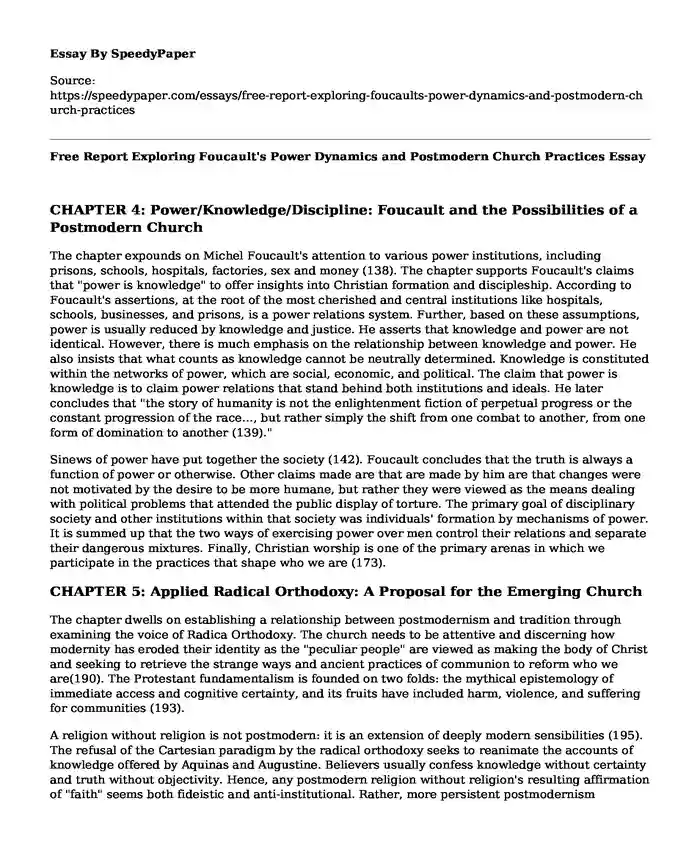CHAPTER 4: Power/Knowledge/Discipline: Foucault and the Possibilities of a Postmodern Church
The chapter expounds on Michel Foucault's attention to various power institutions, including prisons, schools, hospitals, factories, sex and money (138). The chapter supports Foucault's claims that "power is knowledge" to offer insights into Christian formation and discipleship. According to Foucault's assertions, at the root of the most cherished and central institutions like hospitals, schools, businesses, and prisons, is a power relations system. Further, based on these assumptions, power is usually reduced by knowledge and justice. He asserts that knowledge and power are not identical. However, there is much emphasis on the relationship between knowledge and power. He also insists that what counts as knowledge cannot be neutrally determined. Knowledge is constituted within the networks of power, which are social, economic, and political. The claim that power is knowledge is to claim power relations that stand behind both institutions and ideals. He later concludes that "the story of humanity is not the enlightenment fiction of perpetual progress or the constant progression of the race…, but rather simply the shift from one combat to another, from one form of domination to another (139)."
Sinews of power have put together the society (142). Foucault concludes that the truth is always a function of power or otherwise. Other claims made are that are made by him are that changes were not motivated by the desire to be more humane, but rather they were viewed as the means dealing with political problems that attended the public display of torture. The primary goal of disciplinary society and other institutions within that society was individuals' formation by mechanisms of power. It is summed up that the two ways of exercising power over men control their relations and separate their dangerous mixtures. Finally, Christian worship is one of the primary arenas in which we participate in the practices that shape who we are (173).
CHAPTER 5: Applied Radical Orthodoxy: A Proposal for the Emerging Church
The chapter dwells on establishing a relationship between postmodernism and tradition through examining the voice of Radica Orthodoxy. The church needs to be attentive and discerning how modernity has eroded their identity as the "peculiar people" are viewed as making the body of Christ and seeking to retrieve the strange ways and ancient practices of communion to reform who we are(190). The Protestant fundamentalism is founded on two folds: the mythical epistemology of immediate access and cognitive certainty, and its fruits have included harm, violence, and suffering for communities (193).
A religion without religion is not postmodern: it is an extension of deeply modern sensibilities (195). The refusal of the Cartesian paradigm by the radical orthodoxy seeks to reanimate the accounts of knowledge offered by Aquinas and Augustine. Believers usually confess knowledge without certainty and truth without objectivity. Hence, any postmodern religion without religion's resulting affirmation of "faith" seems both fideistic and anti-institutional. Rather, more persistent postmodernism embraces the incarnational scandal of determinate confession and its institution, a confessionally governed church, and dogmatic theology. The catholic faith describes the affirmation of time and tradition (212). The sectarian version of the evangelical identity sees themselves as a relatively new invention or the "new" recoveries of true faith and New Testament church principles. However, these sectarians exhibit a paradoxical blend of primitivism and temporal hubris. The versions of Christianity are usually interested in being "apostolic" and "holy" than being "catholic," thinking that these traits could be separated. The catholic faith means that this kind of faith is the one that separates or distinguishes people of God from secular and pagan faiths in the contemporary world (215). To be postmodern, there is a need to recover elements of ancient rituals and practice for its liturgy that honors fleshiness.
Works Cited
Smith, James KA. Who's Afraid of Postmodernism?(The Church and Postmodern Culture): Taking Derrida, Lyotard, and Foucault to Church. Baker Academic, 2006.
Cite this page
Free Report Exploring Foucault's Power Dynamics and Postmodern Church Practices. (2024, Jan 20). Retrieved from https://speedypaper.net/essays/free-report-exploring-foucaults-power-dynamics-and-postmodern-church-practices
Request Removal
If you are the original author of this essay and no longer wish to have it published on the SpeedyPaper website, please click below to request its removal:
- Free Essay Example: Doctrine and Politics of the Early Church
- Essay Sample about Philosophy of Church Leadership Development
- Role Play on Hindu-Muslim Tension, Free Essay for You
- The Mediterranean World Since 1500 - Paper Example
- Essay Sample on Global Church Trends
- Paper Example: Analysis of Two Faiths
- Understanding the Background of the New Testament - Paper Example
Popular categories





